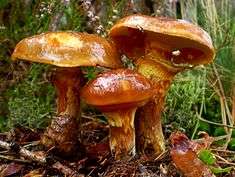Suillus grevillei
| Suillus grevillei | |
|---|---|
 | |
| Common / secure | |
| Scientific classification | |
| Kingdom: | Fungi |
| Division: | Basidiomycota |
| Class: | Agaricomycetes |
| Order: | Boletales |
| Family: | Suillaceae |
| Genus: | Suillus |
| Species: | S. grevillei |
| Binomial name | |
| Suillus grevillei (Klotzsch) Singer | |
| Synonyms | |
|
Suillus elegans | |
| Suillus grevillei | |
|---|---|
|
| |
| pores on hymenium | |
| cap is convex | |
| stipe has a ring | |
| spore print is ochre | |
| ecology is mycorrhizal | |
| edibility: edible | |
Suillus grevillei (commonly known as Greville's bolete and larch bolete) is a mycorrhizal mushroom with a tight, brilliantly coloured cap, shiny and wet looking with its mucous slime layer. The hymenium easily separates from the flesh of the cap, with a central stalk that is quite slender. The species has a ring or a tight-fitting annular zone.
Description
Suillus grevillei is a mushroom with a 5–10 cm (2–4 in) cap colored from citrus yellow to burnt orange, that is at first hemispherical, then bell-shaped, and finally flattened. It has a sticky skin, short tubes of yellow or brownish which descend down to the bottom of its cylindrical stalk (6–10 x 1–2 cm) which is cream-colored turning to reddish brown with a cream-white ring.
It has a thin meat which has consistency at first but then quickly becomes soft. It has an odor reminiscent of rumpled Pelargonium geranium leaves.
It grows in the soil of mixed forests, not always at the foot of larch (can be quite some distance away) with which it lives in symbiosis. It grows from June until November.
Suillus grevillei is an edible mushroom (without consistency nor flavor) if the slimy cuticle is removed off the cap. This mucousy skin layer is what is known to cause intestinal issues, as is the case with several other Suillus such as Slippery Jack (S. luteus) or Jill (S. salmonicolor); often considered to be not worth the work.
Its name is derived from Robert Kaye Greville.[1]
Habitat and distribution
In Asia, it has been recorded from Taiwan.[2]
See also
References
- ↑ natura.provincia.cuneo.it (In italian), accessed 5 August 2008
- ↑ Yeh K-W, Chen Z-C. (1980). "The boletes of Taiwan" (PDF). Taiwania. 25 (1): 166–184.
Works in French
- Régis Courtecuisse, Bernard Duhem : Guide des champignons de France et d'Europe (Delachaux & Niestlé, 1994-2000).
- Marcel Bon : Champignons de France et d'Europe occidentale (Flammarion, 2004)
- Dr Ewaldt Gerhardt : Guide Vigot des champignons (Vigot, 1999) - ISBN 2-7114-1413-2
- Roger Phillips : Les champignons (Solar, 1981) - ISBN 2-263-00640-0
- Thomas Laessoe, Anna Del Conte : L'Encyclopédie des champignons (Bordas, 1996) - ISBN 2-04-027177-5
- Peter Jordan, Steven Wheeler : Larousse saveurs - Les champignons (Larousse, 1996) - ISBN 2-03-516003-0
- G. Becker, Dr L. Giacomoni, J Nicot, S. Pautot, G. Redeuihl, G. Branchu, D. Hartog, A. Herubel, H. Marxmuller, U. Millot et C. Schaeffner : Le guide des hampignons (Reader's Digest, 1982) - ISBN 2-7098-0031-4
- Henri Romagnesi : Petit atlas des champignons (Bordas, 1970) - ISBN 2-04-007940-8
This article is based on a translation of the corresponding article on the French Wikipedia.
External links
| Wikimedia Commons has media related to Suillus grevillei. |
- Suillus grevillei in Index Fungorum
- Baura G, Szaro TM, Bruns TD. 1992. Gastrosuillus laricinius is a recent derivative of Suillus grevillei: molecular evidence. Mycologia 84(4): 592–597.